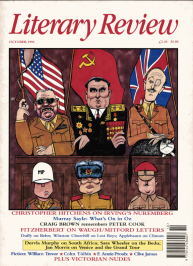Christopher Hitchens
No Cause to be Proud of our Victor’s Justice
Nuremberg: The Last Battle
By David Irving
Focal Point 400pp £20
The title of David Irving’s latest volume is well chosen. The Nuremberg trials were indeed the last engagement between the Third Reich and the four principal Allies. They were also the first engagement between those four Allies on many of the points that would later be subsumed under the heading ‘Cold War’. And they constituted, in more than one way, an act of war, without which they would have had no real justification. Since Irving is the principal revisionist historian of the Second World War, and has entered numerous dissents about its motives and its conduct, his oeuvre would be incomplete without a second look at the grandest moral effort of the victors.
‘Military justice’, remarked Georges Clemenceau on another occasion, ‘is to justice what military music is to music.’ (I think he was referring to the Dreyfus case – an episode not yet visited by Irving.) The full name of the Nuremberg court was ‘The International Military Tribunal’, and much of its character and proceeding can be deduced from that fact alone. Since it had to conduct a trial on at least two charges – war crime and conspiracy to wage aggressive war – that were new to jurisprudence, it is hardly surprising that many of the proceedings looked and felt as if they had been designed by a wartime bureaucracy.
But, as Irving begins by pointing out, there was nearly no hearing at all. Many of the Allied leaders wanted to kill the Nazi High Command out of hand, or to have them proclaimed fair game to anybody who apprehended them. At different times, Churchill and Roosevelt both espoused this

Sign Up to our newsletter
Receive free articles, highlights from the archive, news, details of prizes, and much more.@Lit_Review
Follow Literary Review on Twitter
Twitter Feed
How to ruin a film - a short guide by @TWHodgkinson:
Thomas W Hodgkinson - There Was No Sorcerer
Thomas W Hodgkinson: There Was No Sorcerer - Box Office Poison: Hollywood’s Story in a Century of Flops by Tim Robey
literaryreview.co.uk
How to ruin a film - a short guide by @TWHodgkinson:
Thomas W Hodgkinson - There Was No Sorcerer
Thomas W Hodgkinson: There Was No Sorcerer - Box Office Poison: Hollywood’s Story in a Century of Flops by Tim Robey
literaryreview.co.uk
Give the gift that lasts all year with a subscription to Literary Review. Save up to 35% on the cover price when you visit us at https://literaryreview.co.uk/subscribe and enter the code 'XMAS24'